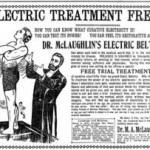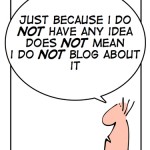For this week’s entry on ethical blogging, I’m going to look at an aspect of monetisation that is very popular: affiliate marketing. This particular form of online marketing is gaining such popularity that it is often spoken about more positively than standard advertising by many people seeking to make money online.
For those who aren’t aware, affiliate marketing is basically a process whereby you send readers over to a partner website and earn money based on sales made through your referral. The most common ethical problem that presents itself in relation to this is whether or not you disclose your earning potential.
There are many different types of affiliate marketing that bloggers can take advantage of. The most popular of these is the programme run by Amazon, which is a very well run system that is both trustworthy and effective. Beyond Amazon there are plenty of others to choose from, covering almost every blogging niche that you could come up with. Some of these are better than others, but what I want to do here is just give some pointers in how to use affiliate marketing in an ethical manner. When done correctly, such a form of monetisation can really be of great benefit to your readers as well as helping lift your site’s bottom line.
Full Disclosure
The most important practice is disclosing the affiliate connections that you have. Advertising is usually quite clearly identifiable, but with affiliate promotions this can often be harder to determine. The point here is that when you send your readers off to a site that will give you a kickback for every sale they should know that this is the case.
This isn’t so much a practice to adhere to just on principal (although that certainly isn’t a bad motivation) – more that it allows you to build a sense of trust and integrity. Your readers will know what you have to gain by writing about particular companies or products, which in turn should hopefully coincide with you believing in what you are promoting.
By disclosing your affiliate connections your work is less likely to read like a press release and also allows your readers to decide whether they feel you deserve to benefit from purchases that they make online. Giving your readers this choice shows that you respect them and are honest and open about giving them the power to create profit for your site.
Promote what you believe in
In a similar manner to the use of advertising in general, it is very important that any connections you may profit from honestly have your personal seal of approval. Whether or not others agree with you is not necessarily relevant, as long as you yourself believe that what you are promoting is worth purchasing or doing business with. Reviewing every best-selling book on Amazon might seem like a good way to increase your chances of making a sale, but have you even read the book? Are you giving an honest review of both its positive and negative points, or just hyping it up in the hopes of making a bit of extra cash?
You can’t promote what you believe in without first having used it, or at the very least having had previous experience of the product creators and knowing that their work is generally of high-quality. Affiliate monetisation should be about matching the right product with the right visitor, not just making a sale. When used in this way it can be a very powerful tool and you will also be improving the lives of your readers – even if only in a small way.
Product relevance
This point is similar to what I have said before about the use of advertising on your site. Make sure that the products you promote are relevant to your audience and they will be interested – possibly even thankful – for hearing about them. This doesn’t just make sense ethically, but it also makes sense from a perspective of profit.
Relevance makes your website a more useful resource for those who visit it, and in the end ethical blogging is about creating a site that improves the internet as a whole rather than just becoming another piece of trash on the pile. For example: don’t promote offers for gambling sites on a blog that focuses on financial troubles, because you not only aren’t doing your readers any favours but may quite possibly cause some real detriment.
Find the best deal
If you know of a better place where the product can be bought then you should disclose this – if not consider whether you should use such an existing affiliate partner in this instance at all. Disclosure of the affiliate connection is not really enough, you should also be wanting to find your readers the best possible deal.
This doesn’t necessarily mean that you must spend days researching a product’s price (although that certainly can’t hurt your authority on the matter), but you should do a quick search for the product to make sure that what you are linking to isn’t being bettered elsewhere. Having said this, you might decide that the site with the best price isn’t necessarily the most trustworthy. In this case you should build this into your post, show that you have done the research and highlight why you still think that your affiliate is the better place to go.
Again, like many things to do with ethical blogging, it’s not something that you only need do for principle – it can actually build a sense of loyalty from your readers and cause them to respect you more. Everything you should do in regards to ethical blogging needs to have your readers in mind.
Freebies and Pay-Per-Post
I’m going to classify these two spheres into affiliate marketing, even though technically it might be said that they fit into their own categories. However, because you are receiving benefit from your writing and promotion of particular topics I do believe that it fits firmly into the guidelines presented above. All of the above should be applied in these instances (full disclosure may actually be the law in your area!), and furthermore you may wish to consider whether or not to even go down these paths at all.
Freebies are a difficult area. For example, many sites that belong to large blog networks do not allow their authors to accept freebies from companies. Quite often, such freebies come with direct – or at least an implied – contract to speak about the donor in a positive light. It is important that your voice holds its integrity, because an honest and open approach to content is something that lies at the core of improving the internet as a whole.
Pay-Per-Post is something that you should try and avoid at all costs. There are a few instances that fit into the framework of ethical blogging – however, quite frequently they come with so many caveats and restrictions that you cannot possibly maintain the level of honesty and frankness that is necessary when promoting products or companies on your site. In some instances you are even given particular text or tag-lines to use, taking you away from the voice blogging gives you to express yourself and share your views with others.
One of the real dangers of going down this route, is that you will be tempted to take up profitable jobs that you may not have any real authority to speak about. It’s a difficult path to walk ethically, which is why I would suggest that you stay well clear of it entirely. Freebies should be left up to a case-by-case basis, but if a condition of receiving something is that you write about it (rather than being sent something without obligation) then I would strongly recommend that you consider refusing such bribery.
Conclusion
Monetisation of your blog is not a necessarily unethical practice, and affiliate marketing is no different, as long as you understand how to do so openly and with your readers benefit in mind. Like any other form of monetisation, your readers should be placed first and foremost when it comes to your motivation for pursuing such a path and the actions you take.
Ethical blogging is about creating a better internet for all. The blogosphere is increasingly gaining authority and visitor numbers, and most of the websites that people visit these days looking for advice are blogs whether they realise it or not. It is the duty of the ethical blogger to help ensure that the information they find is accurate and beneficial to them.
In addition to this, a vital component of the usefulness of blogging comes from our continued sense of personal integrity and honest voice. Blogs distinguish themselves from many corporate and commercial sites simply because we are able to speak our minds, we are able to share our opinions and create dialogue that for-profit enterprises may not be able to do.
Affiliate marketing can be a useful tool in your monetisation arsenal, but it can also become a dark temptation that pulls you away from useful blogging and points you down the path of creating content that only serves to decrease the usefulness of the internet and push it further into the hands of corporate interests and profiteering.
Don’t become another anonymous marketing tool that is taken advantage of. Instead, use affiliate programmes to show people the products that you love, improving their lives (however slightly) in the process.
[ad name=”Google Adsense-Link Banner x4″]






